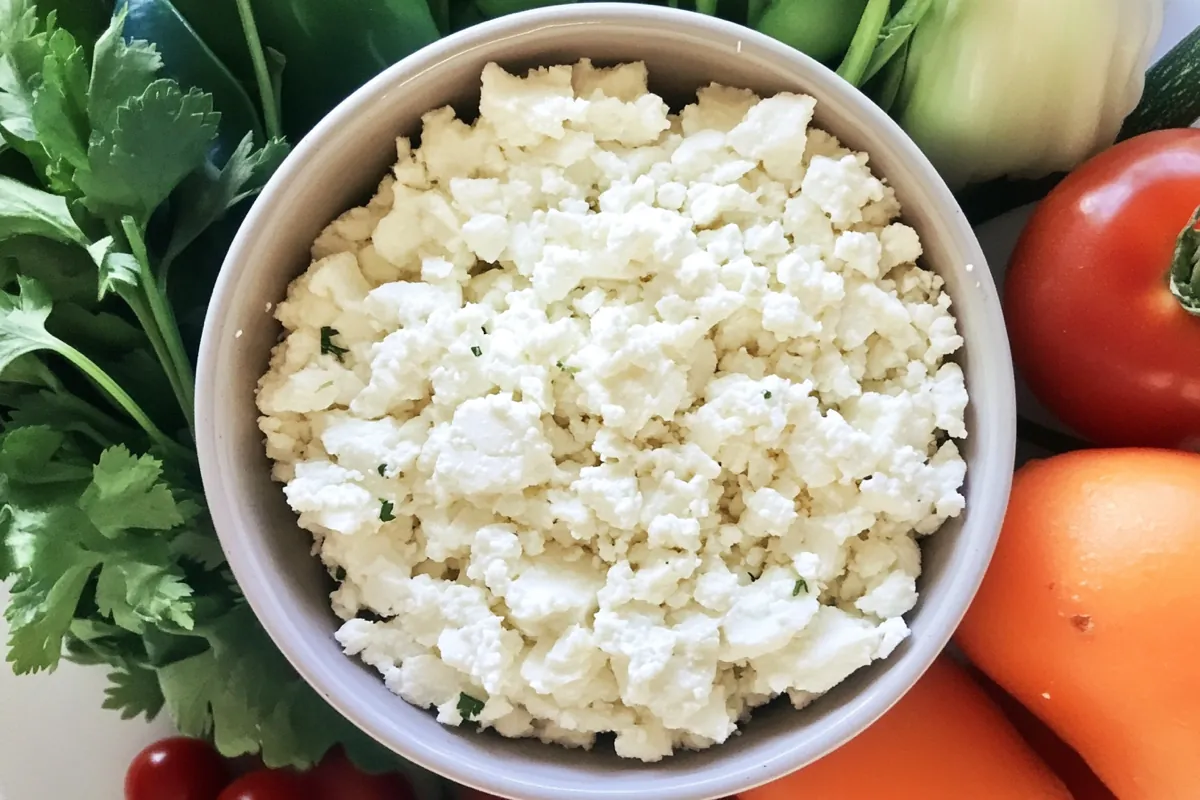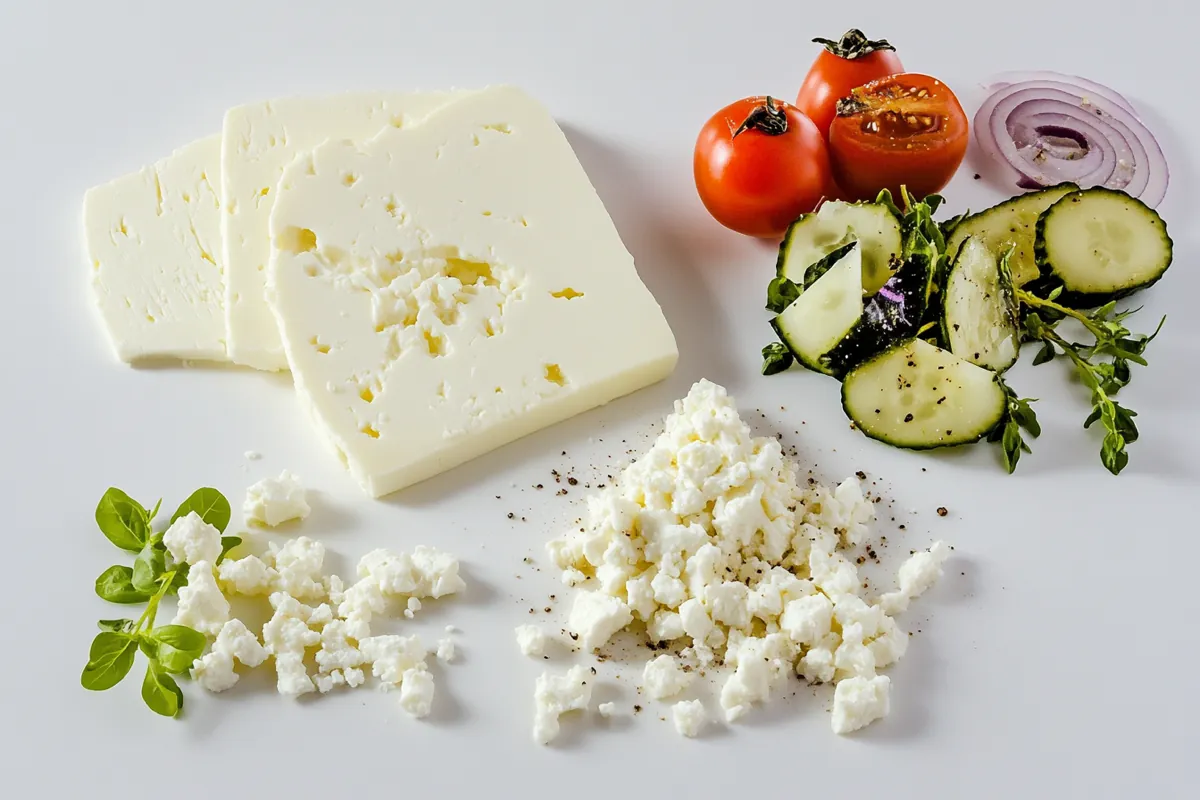Feta cheese is a popular ingredient in Mediterranean diets, known for its tangy flavor and crumbly texture. This cheese has gained attention for its potential health benefits, especially among those looking to maintain a healthy lifestyle. In this article, we will explore the calories in feta cheese, its nutritional profile, and its impact on weight loss and cholesterol levels.
Table of Contents
Introduction to Feta Cheese
Feta cheese has been a staple in Greek cuisine for centuries. Traditionally made from sheep’s milk or a mixture of sheep and goat’s milk, it is characterized by its distinct tangy taste and crumbly consistency. Feta can be enjoyed in salads, pastries, or as a topping for various dishes, making it a versatile addition to any meal.
One of the most appealing aspects of feta cheese is its relatively low calorie content compared to other cheeses. This makes it a popular choice for those aiming to manage their weight while still enjoying rich flavors. In this article, we will delve deeper into its nutritional makeup, exploring how many calories are in feta cheese and how it can fit into a balanced diet.
What is Feta Cheese?
Feta cheese originates from Greece and has been made for thousands of years. The name “feta” comes from the Italian word “fetta,” meaning “slice,” referring to how the cheese is typically served. It is made by curdling milk with rennet and allowing it to age in a brine solution, which gives it its unique flavor and texture.
Feta cheese can be found in various forms, including blocks, crumbles, or crumbled varieties. While the traditional cheese is made from sheep’s milk, many brands offer cow’s milk versions. However, the taste and texture may vary slightly between types.
Nutritional Profile of Feta Cheese
Feta cheese is not only delicious but also packed with essential nutrients. A typical serving of feta cheese (about 1 ounce or 28 grams) contains approximately:
- Calories: 75-80
- Protein: 4-5 grams
- Fat: 6 grams (mostly healthy fats)
- Carbohydrates: 1-2 grams
- Calcium: 14% of the daily value
These numbers may vary slightly depending on the brand and type of feta cheese. Despite its relatively low calorie count, feta cheese offers a substantial amount of protein and calcium, making it a great addition to a balanced diet.
Calories in Feta Cheese: A Breakdown
When considering calories in feta cheese, it’s essential to note that different types can have varying calorie counts. Here’s a quick breakdown:
- Regular Feta Cheese: About 75-80 calories per ounce.
- Reduced-Fat Feta Cheese: Ranges from 50-60 calories per ounce.
- Fat-Free Feta Cheese: Approximately 30-40 calories per ounce.
Incorporating feta into meals can provide flavor without significantly increasing calorie intake. This makes it an excellent option for those mindful of their dietary choices.
Comparison with Other Cheeses
Feta cheese is often compared to other types of cheese regarding calories and nutritional content. Here’s a quick comparison:
- Cheddar Cheese: About 110 calories per ounce.
- Mozzarella Cheese: Approximately 85 calories per ounce.
- Parmesan Cheese: Around 120 calories per ounce.
As seen, feta cheese has a lower calorie count compared to many other popular cheeses, making it a favorable option for those looking to enjoy cheese without the extra calories.
Is Feta Cheese Healthy for Weight Loss?
When it comes to weight loss, the key is balance and moderation. Feta cheese can play a role in a healthy, low-calorie diet. Its unique flavor allows it to enhance dishes without the need for excessive amounts.
The Role of Feta Cheese in a Balanced Diet
Incorporating feta cheese into a balanced diet can provide essential nutrients while keeping calorie counts low. For example, sprinkling feta on salads or mixing it into whole grains can elevate the dish’s flavor without adding excessive calories.
Moreover, the protein content in feta cheese can help you feel fuller longer, which may reduce overall calorie intake throughout the day. This can be particularly beneficial for those following a weight loss plan.
Portion Control and Weight Management
Portion control is crucial when incorporating any food into your diet, including feta cheese. While it is lower in calories compared to other cheeses, it is still important to monitor the serving

Feta Cheese Protein: A Closer Look
Feta cheese is not just a flavorful addition to meals; it also contributes a significant amount of protein to your diet. Understanding the protein content in feta cheese can help you make informed choices about incorporating it into your meals, especially for those looking to boost their protein intake.
Protein Content in Feta Cheese
In a one-ounce serving of feta cheese, you can expect to find about 4 to 5 grams of protein. This may seem modest, but when combined with other protein sources, it can contribute to a well-rounded diet. The protein in feta cheese is of high quality, containing essential amino acids that your body needs for various functions, including muscle repair and growth.
In addition to feta, consider pairing it with other protein-rich foods. For instance, adding feta to a salad with chickpeas, or mixing it into whole grain pasta can create a balanced meal that keeps you satisfied for longer.
Benefits of Protein for Weight Loss
Protein plays a crucial role in weight loss and overall health. Here are some key benefits of incorporating adequate protein into your diet:
- Satiety: Protein is known to help you feel fuller longer, which can reduce snacking and overeating.
- Muscle Maintenance: A high-protein diet supports muscle mass, which is essential during weight loss. Maintaining muscle helps boost metabolism.
- Thermogenesis: The body burns more calories digesting protein compared to fats and carbohydrates. This can aid in weight management.
Feta cheese, when included as part of a balanced diet, can help you meet your protein needs without excessive calories.
How Feta Cheese Fits into High-Protein Diets
Many people are turning to high-protein diets for weight loss and muscle gain. Feta cheese can easily fit into these diets due to its protein content and flavor. Here are some ideas on how to include feta cheese in a high-protein meal plan:
- Breakfast: Add crumbled feta to an omelet with spinach and tomatoes for a nutritious start to your day.
- Lunch: Mix feta into quinoa salads with beans and vegetables for a protein-packed meal.
- Dinner: Use feta as a topping for grilled chicken or fish to enhance flavor and nutritional value.
By incorporating feta cheese into your meals, you can enjoy the benefits of protein while keeping your dishes exciting and flavorful.
Is Feta Cheese Good for Cholesterol?
Cholesterol management is a significant concern for many individuals, especially those with a family history of heart disease. Understanding how feta cheese affects cholesterol levels can help you make informed dietary choices.
Understanding Cholesterol: The Good vs. The Bad
Cholesterol is a waxy substance found in your blood, essential for building cells. However, there are two types of cholesterol:
- LDL (Low-Density Lipoprotein): Often referred to as “bad” cholesterol, high levels can lead to plaque buildup in arteries, increasing the risk of heart disease.
- HDL (High-Density Lipoprotein): Known as “good” cholesterol, it helps remove LDL cholesterol from the bloodstream.
A balanced diet can help maintain healthy cholesterol levels. Including foods that support heart health is crucial, and this is where feta cheese can come into play.
How Feta Cheese Influences Cholesterol Levels
Feta cheese contains a moderate amount of fat, but the type of fat matters. Most of the fat in feta is unsaturated, which can be beneficial for heart health when consumed in moderation. Research suggests that including moderate amounts of dairy, like feta cheese, may not negatively impact cholesterol levels for most people.
Additionally, feta cheese is rich in calcium, which has been linked to improved cholesterol levels. Here are some points to consider:
- Saturated Fat Content: While feta cheese does contain some saturated fat, it is lower than many other cheeses. Moderation is key.
- Calcium Benefits: The calcium in feta can help improve overall heart health and may positively influence cholesterol levels.
Comparing Feta Cheese with Other Cheese Types
When considering is feta cheese good for cholesterol, it’s helpful to compare it with other cheeses. Here’s how feta stacks up:
- Cheddar Cheese: Higher in saturated fats, which can impact cholesterol negatively if consumed in excess.
- Mozzarella Cheese: Similar to feta but often has a higher moisture content and can be lower in calories.
- Blue Cheese: Generally higher in fat and calories compared to feta, making it less favorable

Health Benefits of Feta Cheese
Feta cheese is more than just a flavorful addition to your meals; it also offers a range of health benefits. Understanding these can help you make informed dietary choices and enjoy the delicious taste of feta while supporting your overall health.
Nutritional Advantages of Feta Cheese
Feta cheese is nutrient-dense, meaning it provides a significant amount of vitamins and minerals relative to its calorie content. Here are some notable nutritional benefits of feta cheese:
- Calcium: Feta cheese is an excellent source of calcium, which is essential for maintaining strong bones and teeth. It helps prevent osteoporosis and supports muscle function.
- B Vitamins: Feta contains several B vitamins, including B12 and riboflavin, which are vital for energy production and overall metabolism.
- Antioxidants: Some studies suggest that feta cheese may contain antioxidants that can help combat oxidative stress and inflammation in the body.
Incorporating feta cheese into your diet can enhance your nutritional intake without adding excessive calories, making it a smart choice for health-conscious individuals.
Feta Cheese in Mediterranean Diet: A Case Study
The Mediterranean diet has gained popularity for its numerous health benefits, including heart health and weight management. Feta cheese is a staple in this diet, often featured in salads, spreads, and main dishes. Here’s how feta cheese fits into the Mediterranean lifestyle:
- Heart Health: The Mediterranean diet emphasizes healthy fats, whole grains, and lean proteins, making feta cheese a perfect fit. Its unsaturated fat content can help improve cholesterol levels and overall heart health.
- Weight Management: The combination of protein and healthy fats in feta cheese contributes to satiety, helping you feel fuller longer and reducing the likelihood of overeating.
- Flavor without Guilt: Feta cheese adds richness and flavor to dishes without the high calorie count of other cheeses, allowing for delicious meals that support weight loss goals.
Studies have shown that adhering to the Mediterranean diet can lower the risk of heart disease, diabetes, and certain cancers. Incorporating feta cheese can make healthy eating enjoyable and sustainable.
Potential Health Risks Associated with Feta Cheese
While feta cheese has many benefits, it’s essential to consume it in moderation. Here are some considerations to keep in mind:
- Sodium Content: Feta cheese can be high in sodium due to the brining process. Too much sodium in your diet can lead to high blood pressure and other cardiovascular issues. It’s wise to choose low-sodium feta options when possible.
- Lactose Intolerance: Individuals with lactose intolerance may experience discomfort after consuming feta cheese. However, many find that they can tolerate feta better than other dairy products due to its lower lactose content.
- Allergies: Some people may have a dairy allergy or sensitivity. If you experience any adverse reactions, it’s best to consult with a healthcare professional.
Balancing your intake of feta cheese while being mindful of these potential risks will allow you to enjoy its benefits without compromising your health.
Cooking and Serving Suggestions for Feta Cheese
Feta cheese is versatile and can be used in various dishes, making it easy to incorporate into your meals. Its tangy flavor pairs well with many ingredients, enhancing both taste and nutrition.
Popular Dishes Utilizing Feta Cheese
Here are some popular dishes that feature feta cheese:
- Greek Salad: A classic dish made with tomatoes, cucumbers, olives, and feta cheese, drizzled with olive oil and oregano.
- Spinach and Feta Stuffed Chicken: Chicken breasts filled with a mixture of spinach, feta, and herbs, baked until tender and juicy.
- Feta and Quinoa Salad: A refreshing salad combining cooked quinoa, fresh vegetables, and crumbled feta, dressed with lemon and olive oil.
These dishes not only taste delicious but also provide a range of nutrients, making them excellent choices for a balanced diet.
Creative Ways to Incorporate Feta Cheese into Meals
Looking for creative ways to enjoy feta cheese? Here are some ideas:
- Breakfast Bowls: Top oatmeal or yogurt with crumbled feta, fresh fruit, and a drizzle of honey for a unique breakfast.
- Savory Muffins: Add feta and herbs to muffin batter for a savory twist on a classic breakfast item.
- Stuffed Vegetables: Hollow out bell peppers or zucchini and fill them with a mixture of feta, rice, and spices before baking.
These ideas showcase the versatility of feta cheese, allowing you to enjoy its flavor and health benefits in various meals throughout the day.

Conclusion: Balancing Feta Cheese in Your Diet
Feta cheese is a delicious and nutritious option that can fit seamlessly into a balanced diet. With its relatively low calorie count, high protein content, and essential nutrients, feta can be a valuable addition to your meals.
Final Thoughts on Feta Cheese and Health
Incorporating feta cheese into your diet can enhance flavors while providing significant nutritional benefits. Whether you enjoy it in salads, as a topping for grains, or in savory dishes, feta can help you maintain a healthy lifestyle without sacrificing taste.
Encouragement to Explore Feta Cheese in Moderation
While feta cheese offers many health benefits, moderation is crucial. Pay attention to portion sizes, especially if you are mindful of sodium intake. By enjoying feta cheese as part of a varied and balanced diet, you can reap its benefits while delighting in its unique flavor.
FAQ
As feta cheese continues to gain popularity, many people have questions about its nutritional value, especially regarding calories and its impact on health. Here, we address some frequently asked questions to provide clarity on these topics.
Is Feta Cheese OK to Eat When Dieting?
Yes, feta cheese can be a healthy addition to a diet plan. Its lower calorie count compared to other cheeses makes it a smart choice. However, portion control is essential. Incorporating feta into your meals can enhance flavors and provide nutritional benefits without significantly increasing calorie intake. Consider adding it to salads, grains, or as a topping for vegetables.
How Many Calories Are in 2 Tablespoons of Crumbled Feta Cheese?
Two tablespoons of crumbled feta cheese (about 30 grams) contain approximately 70-80 calories. This serving provides a nice flavor boost to your dishes without adding too many calories. Using feta in moderation allows you to enjoy its taste while maintaining a balanced diet.
How Many Calories Are in a Full Block of Feta?
A full block of feta cheese typically weighs around 8 ounces (227 grams), containing approximately 600-700 calories. The exact calorie count may vary based on the brand and type of feta. Be mindful of portion sizes when using feta in recipes to keep your calorie intake in check.
Is Greek Feta High in Calories?
Greek feta is similar in calorie content to regular feta cheese. A typical serving of Greek feta (1 ounce) contains about 75-80 calories. The nutritional profile remains consistent, offering a good balance of protein and calcium while still being lower in calories compared to many other cheeses.




